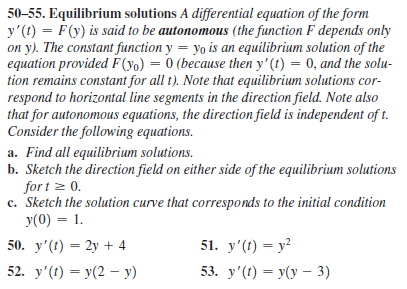50-55. Equilibrium solutions A differential equation of the form y'(t) = F(y) is said to be autonomous (the function F depends only on y). The constant function y = yo is an equilibrium solution of the equation provided F(yo) = 0 (because then y'(t) = 0, and the solu- tion remains constant for all t). Note that equilibrium solutions cor- respond to horizontal line segments in the direction field. Note also that for autonomous equations, the direction field is independent of t. Consider the following equations. a. Find all equilibrium solutions. b. Sketch the direction field on either side of the equilibrium solutions for t z 0. c. Sketch the solution curve that corresponds to the initial condition y(0) = 1. 50. y'(t) = 2y + 4 51. у'() — у? 52. y' () — у(2 — у) 53. y'() — У(у -3)
50-55. Equilibrium solutions A differential equation of the form y'(t) = F(y) is said to be autonomous (the function F depends only on y). The constant function y = yo is an equilibrium solution of the equation provided F(yo) = 0 (because then y'(t) = 0, and the solu- tion remains constant for all t). Note that equilibrium solutions cor- respond to horizontal line segments in the direction field. Note also that for autonomous equations, the direction field is independent of t. Consider the following equations. a. Find all equilibrium solutions. b. Sketch the direction field on either side of the equilibrium solutions for t z 0. c. Sketch the solution curve that corresponds to the initial condition y(0) = 1. 50. y'(t) = 2y + 4 51. у'() — у? 52. y' () — у(2 — у) 53. y'() — У(у -3)
Calculus: Early Transcendentals
8th Edition
ISBN:9781285741550
Author:James Stewart
Publisher:James Stewart
Chapter1: Functions And Models
Section: Chapter Questions
Problem 1RCC: (a) What is a function? What are its domain and range? (b) What is the graph of a function? (c) How...
Related questions
Question

Transcribed Image Text:50-55. Equilibrium solutions A differential equation of the form
y'(t) = F(y) is said to be autonomous (the function F depends only
on y). The constant function y = yo is an equilibrium solution of the
equation provided F(yo) = 0 (because then y'(t) = 0, and the solu-
tion remains constant for all t). Note that equilibrium solutions cor-
respond to horizontal line segments in the direction field. Note also
that for autonomous equations, the direction field is independent of t.
Consider the following equations.
a. Find all equilibrium solutions.
b. Sketch the direction field on either side of the equilibrium solutions
for t z 0.
c. Sketch the solution curve that corresponds to the initial condition
y(0) = 1.
50. y'(t) = 2y + 4
51. у'() — у?
52. y' () — у(2 — у)
53. y'() — У(у -3)
Expert Solution
This question has been solved!
Explore an expertly crafted, step-by-step solution for a thorough understanding of key concepts.
This is a popular solution!
Trending now
This is a popular solution!
Step by step
Solved in 4 steps with 2 images

Recommended textbooks for you

Calculus: Early Transcendentals
Calculus
ISBN:
9781285741550
Author:
James Stewart
Publisher:
Cengage Learning

Thomas' Calculus (14th Edition)
Calculus
ISBN:
9780134438986
Author:
Joel R. Hass, Christopher E. Heil, Maurice D. Weir
Publisher:
PEARSON

Calculus: Early Transcendentals (3rd Edition)
Calculus
ISBN:
9780134763644
Author:
William L. Briggs, Lyle Cochran, Bernard Gillett, Eric Schulz
Publisher:
PEARSON

Calculus: Early Transcendentals
Calculus
ISBN:
9781285741550
Author:
James Stewart
Publisher:
Cengage Learning

Thomas' Calculus (14th Edition)
Calculus
ISBN:
9780134438986
Author:
Joel R. Hass, Christopher E. Heil, Maurice D. Weir
Publisher:
PEARSON

Calculus: Early Transcendentals (3rd Edition)
Calculus
ISBN:
9780134763644
Author:
William L. Briggs, Lyle Cochran, Bernard Gillett, Eric Schulz
Publisher:
PEARSON

Calculus: Early Transcendentals
Calculus
ISBN:
9781319050740
Author:
Jon Rogawski, Colin Adams, Robert Franzosa
Publisher:
W. H. Freeman


Calculus: Early Transcendental Functions
Calculus
ISBN:
9781337552516
Author:
Ron Larson, Bruce H. Edwards
Publisher:
Cengage Learning